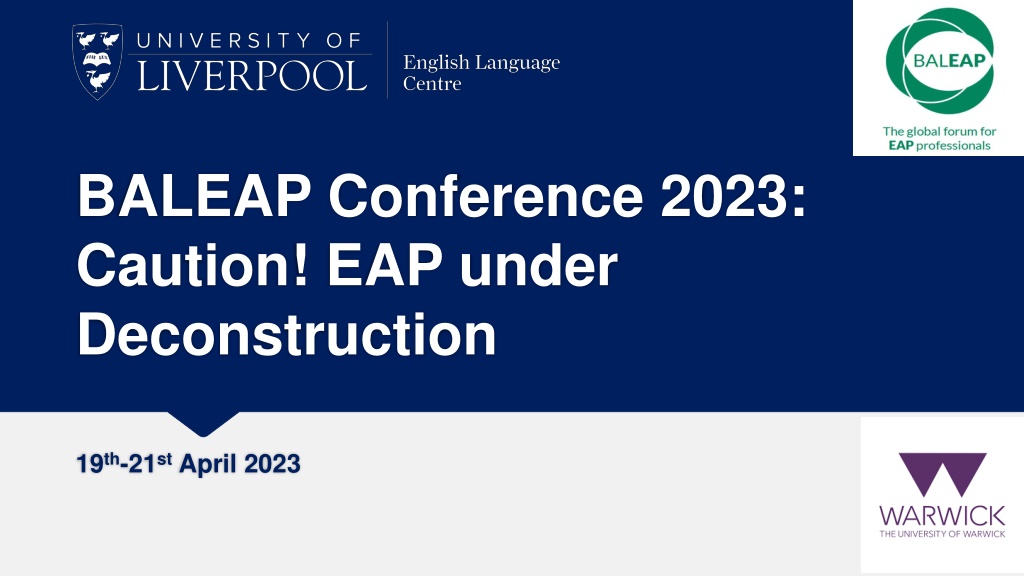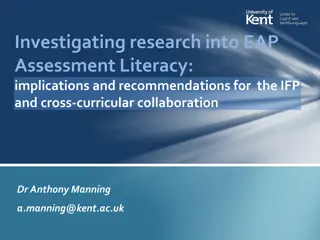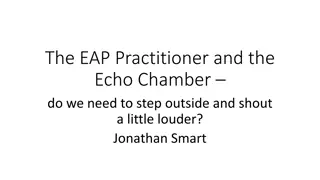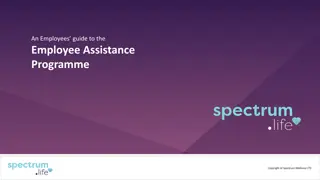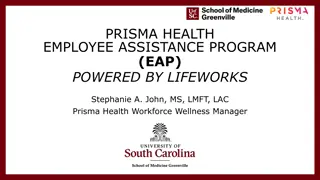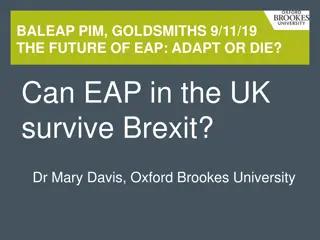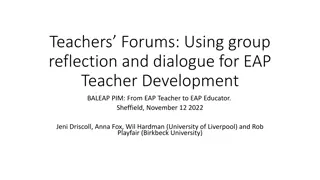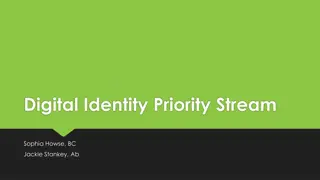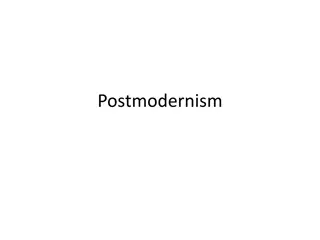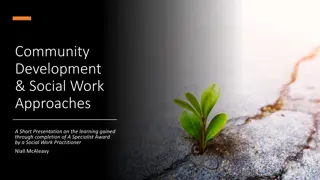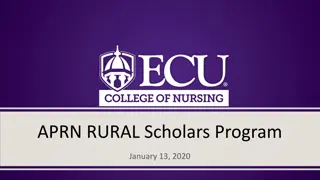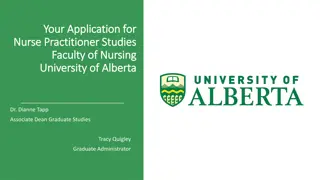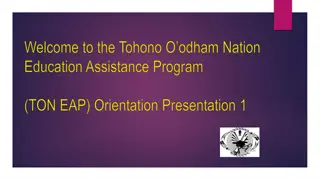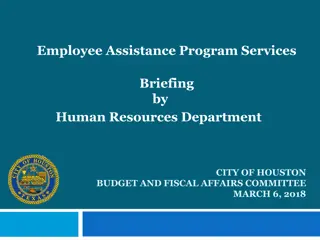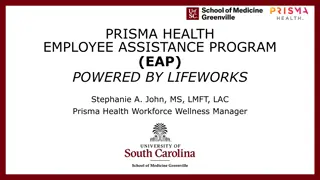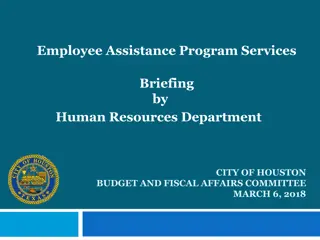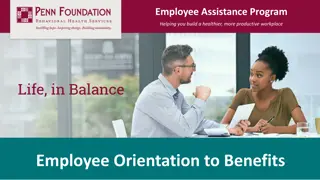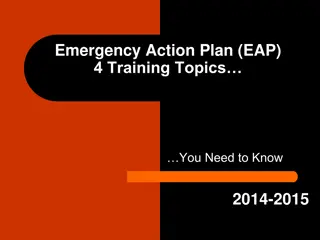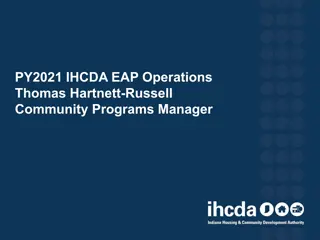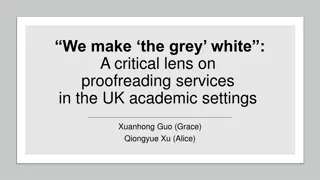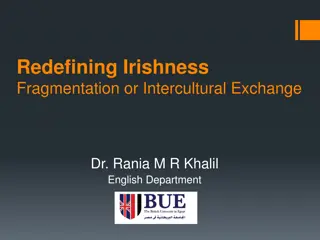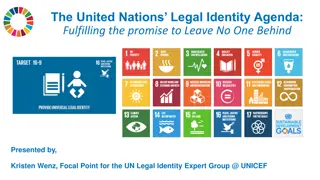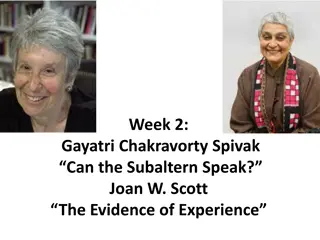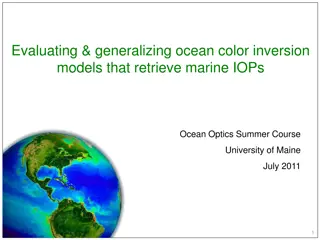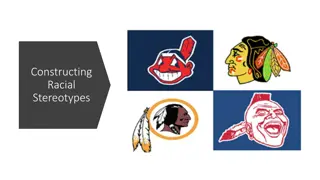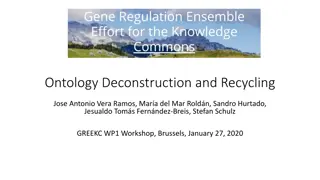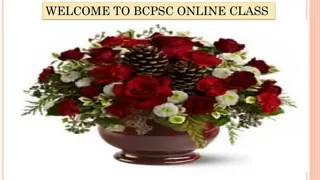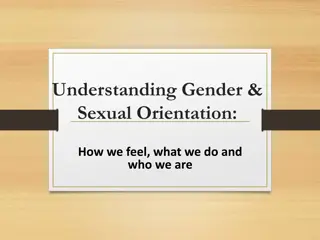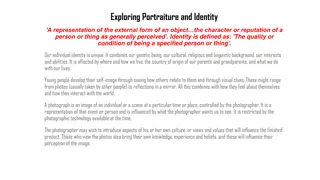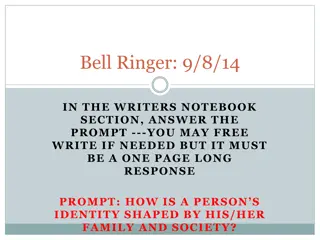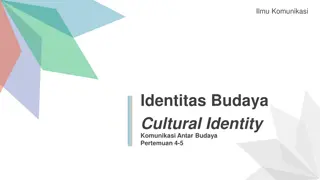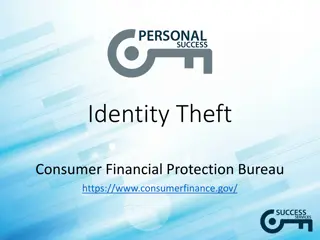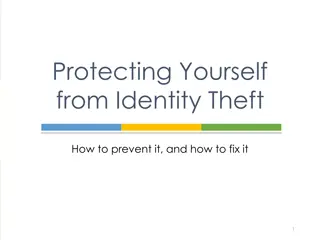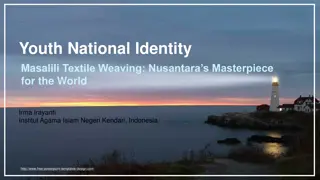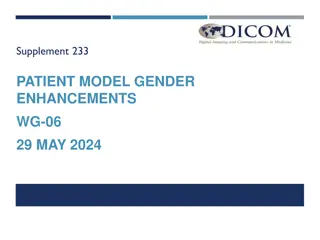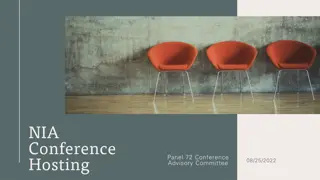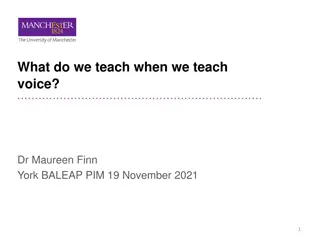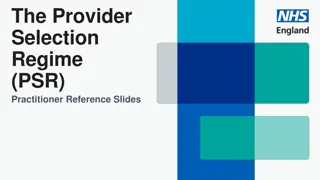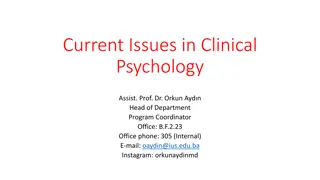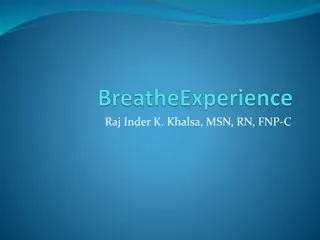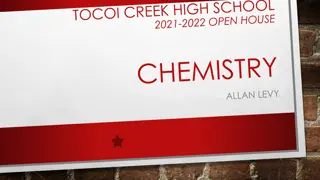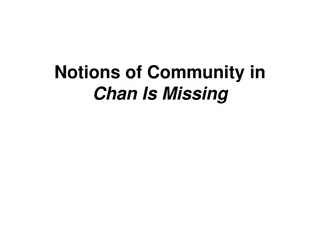Exploring the Deconstruction of EAP Practitioner Identity at BALEAP Conference 2023
Venture out of the EAP comfort zone and delve into the evolving landscape of English for Academic Purposes with a focus on practitioner identity reconstruction. Dr. Jeni Driscoll's presentation at the BALEAP Conference 2023 challenges traditional notions of EAP through collaboration with various disciplines. Discover key questions, including the role of EAP practitioners in embedded discipline-specific contexts, and ongoing projects in STEM courses like Physics that aim to enhance student writing and skills development through innovative approaches.
Download Presentation

Please find below an Image/Link to download the presentation.
The content on the website is provided AS IS for your information and personal use only. It may not be sold, licensed, or shared on other websites without obtaining consent from the author. Download presentation by click this link. If you encounter any issues during the download, it is possible that the publisher has removed the file from their server.
E N D
Presentation Transcript
BALEAP Conference 2023: Caution! EAP under Deconstruction 19th-21stApril 2023
Venturing out of my EAP comfort zone and making the familiar strange: a practitioner reconstructed in collaboration with the disciplines Dr Jeni Driscoll
Introduction Background/context Aims 5 key questions 2 STEM courses Work in Progress: Outcomes and observations Practitioner identity Rethinking 5 key questions in your context
5 Key Questions What is EAP? Who is it for? How do we do EAP? How do we embed EAP? What is the EAP practitioner s role in embedded discipline- specific EAP?
5 Key Questions: Before What is EAP? Who is it for? How do we do EAP? How do we embed EAP? What is the EAP practitioner s role in embedded discipline- specific EAP?
UG Physics: Work in Progress to audit the Physics lab skills module with feedback and recommendations for redesign in the following academic year (essentially using this first year of our collaboration as a foundation for future activities) to use student writing for module and course level needs analysis to inform course aims and design of future skills modules to help module tutors and lab coaches design, create and deliver writing sessions, workshops and masterclasses for physics students to give Physics tutors feedback on their session content, organisation and slides
UG Physics: Work in Progress to do demo session/conduct lab report writing retreats for lab coaches (Physics lecturers and PhD students) for them to mirror with UG physics students to design lab report writing activities to develop a toolkit for lab coaches to use with students rather than a course delivered by an EAP tutor to give feedback on lab coach assessment feedback to students in terms of how it can be improved for clarity/reader-friendliness and actionable feedback on lab report writing to do with a view to skills development and progression across the degree course In absentia?
Observations on Outcomes The Familiar Familiar(ish) to use student writing for module and course level needs analysis to inform course aims and design of future skills modules to design lab report writing activities for a toolkit for lab coaches to use with students rather than a course delivered by an EAP tutor
Observations on Outcomes Strange to audit the Physics lab skills module with feedback and recommendations for the redesign in the following academic year (essentially using this first year of our collaboration as a foundation for future activities) to help module tutors and lab coaches design, create and deliver writing sessions, workshops and masterclasses for physics students to give Physics tutors feedback on their session content, organisation and slides to do demo session/conduct lab report writing retreats for lab coaches (Physics lecturers and PhD students) for them to then mirror with UG physics students to give feedback on lab coach assessment feedback to students in terms of how it can be improved for clarity/reader-friendliness and actionable feedback on lab report writing to do with a view to skills development and progression across the degree course
Observations on Outcomes: Hats in the Hatbox Coach External examiner Collaborator Listener Colleague Teacher trainer Critical friend Writing expert Ethnographer External examiner
PGR Dentistry: Work in Progress EAP for PGRs ESP ESAPP?
Observations on Outcomes The Familiar Strange EAP needs ESP needs Liaison and everything else involved in working with a new discipline ESAPP Fully qualified professionals as students Developing academic guidelines part of the learning process EAP Curriculum designed by students Materials developed online Knowledge blending
Observations on Outcomes: Hats in the Hatbox Listener Academic Advisor Colleague Scholar Collaborator Supervisor Critical friend Teacher trainer Ethnographer Writing expert Mediator Other
But is it EAP? What is EAP?
5 Key Questions: Rethinking What is EAP? Who is it for? How do we do EAP? How do we embed EAP? What is the EAP practitioner s role in embedded discipline-specific EAP?
Discussion What is EAP? Who is it for? How do we do EAP? How do we embed EAP? What is the EAP practitioner s role in embedded discipline-specific EAP?
Bibliography Ding, A. and Bruce, I. 2017. The English for Academic Purposes Practitioner: Operating on the Edge of Academia. The Netherlands: Palgrave Macmillan Fenton-Smith, B. and Gurney, L. 2022. Collaborator, applied linguist, academic, expense? Exploring the professional identities of academic language and learning professionals , Higher Education Pedagogies, 7:1, pp 160-178, DOI: 10.1080/23752696.2022.2130390 Hyland, K. 2006. English for Academic Purposes: An advanced resource book. Oxon: Routledge Hyland, K. 2018. Sympathy for the devil? A defence of EAP , Language Teaching. 5:3, pp. 383-399. doi:10.1017/S0261444818000101 Raimes, A. 1991. Instructional balance: from theory to practices in the theory of writing. In J.E. Alatis (Ed.), Georgetown University round table on languages and linguistics: linguistics and language pedagogy: the state of the art, pp. 238-249. Washington DC: Georgetown University Press. Taylor, S. 2022. Scholarly activity and EAP professional identity: Tensions and alignments In Evans, M. Bond, B. and Ding, A. Innovation, exploration and transformation Proceedings of the 2019 BALEAP Conference. Reading, UK: Garnet Education. Whitchurch, C. 2008. Shifting identities and blurring boundaries: The emergence of third space professionals in UK higher education , Higher Education Quarterly, 62:4, pp 377 396. doi:10.1111/ j.1468- 2273.2008.00387.x
Thank you Jeni.Driscoll@liverpool.ac.uk
